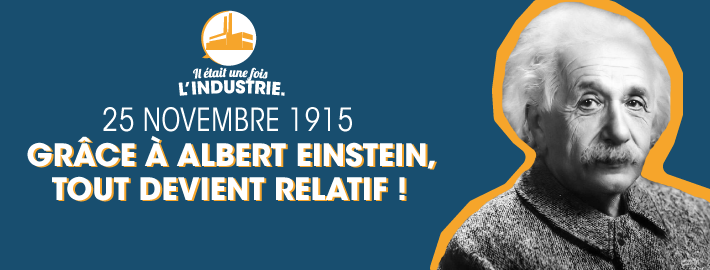GLOBAL
INDUSTRIE
News
Share on

25 November 1915: thanks to Albert Einstein, everything becomes relative!
This week, we look back on the major discovery of the most famous scientist in history who, on the 25th of November 1915, presented his general theory of relativity to the Prussian Royal Academy of Science.
A FAR FROM ORDINARY STUDENT
The famous Albert Einstein, who was born on the 14th of March 1879 in Ulm, was an astonishing personality. His scientific vocation was clear from an early age: he was barely five years old when he became fascinated by a compass, the functioning of which he found "miraculous", to use his own words. It is true that the environment in which he grew up was conducive to reflection. His uncle Jakob, an engineer in his father’s electrical equipment company, enjoyed challenging him with mathematical problems. The young boy also engaged in heated discussions with a medical student who regularly came to his home and who, amused by his curiosity, gave him a large number of scientific and philosophical works.
This quintessentially self-taught man nevertheless had an academic career which was at best atypical… not to say chaotic. He could not stand the power of his teachers, which he saw as arbitrary. His teachers in turn considered him to be a bad element and particularly careless. In 1896, he nevertheless managed to obtain a place in the Zurich Federal Polytechnic School, where he met a certain Mileva Marić, whom he was to marry in 1903 and with whom he was to have three children. After narrowly obtaining his diploma, he applied unsuccessfully for several academic positions before resigning himself to finding a job in the administration. Without however giving up his work…
THE BRAIN
He thus published several articles particularly on special relativity in 1905, which was later to be seen as his annus mirabilis. From then on, he was – at last - drawn into the spiral of academic success. On the 9th of July 1909 he was appointed doctor honoris causa by the University of Geneva and professor at the University of Zurich, before being appointed professor at the University of Prague in 1911. The same year, he was invited to the first Solvay Conference, in Belgium, which brought together the world’s most famous scientists and where he met Marie Curie, Max Planck and Paul Langevin in particular. After returning to Zurich in 1912, he was appointed the following year to the Prussian Academy of Science. In 1914, he moved to Berlin and entered the Royal Academy of Science and Literature, which allowed him to devote himself entirely to his research work.
When World War I broke out, this committed pacifist was going through a deep personal crisis. His wife left him and moved to Switzerland with their children, leaving him alone in Berlin. It was at this time, however, that he was to lay the foundations of modern physics thanks to a revolutionary theory.
On the 25th of November, at the age of barely 37, he submitted a manuscript which was to become legendary to the scholars of the Prussian Royal Academy of Science. The fruit of eight years of hard labor, his General Theory of Relativity came like a thunderbolt which shattered everything the scientific world thought it knew about the universe and how it worked! Introducing the concept of space-time, he explained that these two at first sight separate concepts are in fact linked. The famous British newspaper The Guardian summarized his discovery as follows: "what makes general relativity distinctive is that it treats gravity not as a force between two bodies such as the Sun and the Earth, but as a deformation and a distortion in the geometry of space and time". Have you got that? This theory was highly complex but was nevertheless to make the scientist an international celebrity.
When he died forty years later, on the 18th of April 1955 in Princeton, he had had time to receive the Nobel Prize for Physics in 1921 and his famous equation E=mc2 had, like him, become legendary. He is still today considered to be one of the greatest scientists in history. Time magazine named him as THE personality of the 20th century and in popular culture he symbolizes intelligence, knowledge and genius.
"He who joyfully marches to music rank and file has been given a large brain by mistake, since for him the spinal cord would surely suffice." – Albert Einstein
Other events which happened this week:
- 22 November (1859): birth in Japan of Fusajiro Yamauchi, founder of Nintendo
- 23 November (1868): the Frenchman Louis Arthur Ducos du Hauron files a patent for a color photography process
- 26 November (1965): France launches its first Diamant type rocket
- 26 November (1966): opening of the Rance tidal power station, the biggest in world
- 26 November (1977): commissioning of the Marseille metro
- 26 November (1988): take-off of Soyuz TM-7 to fly to the Mir space station with the French astronaut Jean-Loup Chrétien on board
- 26 November (2003): Concorde’s last flight in Bristol
- 26 November (2011): launch of the Mars Science Laboratory mission to Mars
- 26 November (2019): 250th launch of an Ariane rocket, the 300th French orbital flight
- 27 November (1826): invention of friction matches by the English chemist John Walker
2021.11.22